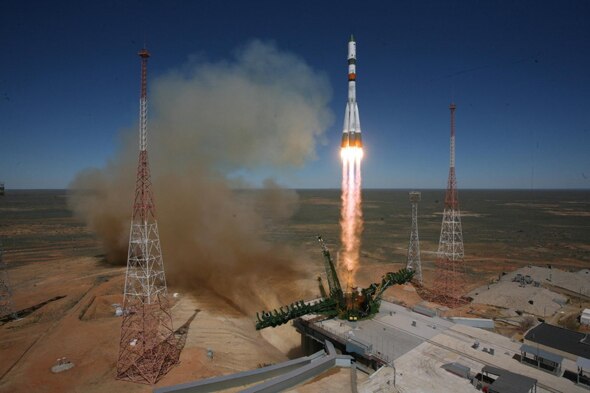Create a free profile to get unlimited access to exclusive videos, sweepstakes, and more!
Breaking: Russian Resupply Mission to the Space Station in Trouble

Note: Information about all this is still coming in, so regard anything here as tentative. I’ll add updates to the bottom of this article as I get more reliable news
Last night, at 07:09 UTC (03:09 Eastern U.S. time), a Soyuz 2-1a rocket lifted off from Kazakhstan, carrying an uncrewed Progress capsule loaded with roughly 3 tons of food and supplies for the astronauts on the International Space Station.
After separation from the third stage, however, ground controllers got data showing the telemetry was sporadic and that only two of the five communication antennas had deployed. Not long after that it became clear the capsule was spinning rapidly, tumbling once every three seconds.
The original plan was to put Progress on a quick trajectory to meet ISS after just four orbits (about six hours). That was then delayed, setting up a Thursday rendezvous. With the spacecraft spinning, this has now been delayed again, this time indefinitely until the problems are fixed.
Update, April 28, 2015, at 19:15 UTC: Video has been downlinked from a camera on the Progress capsule showing it spinning. Note: I had originally said it was tumbling, which implies a multi-axis spin, but it appears here to be spinning on one axis only, so I changed the wording above. Thanks to JP Major, Ian O'Neill, and Rocket_Woman1 on Twitter for the link.
And there may be a time crunch: Some reports indicate the Progress is in a bad orbit. Instead of a slightly elliptical orbit taking it from 190 to 240 kilometers above the Earth’s surface, the current orbit may be dropping it as low as 124 km, where air is substantially thicker. This puts drag on the vehicle, dropping it lower, where air is thicker, dragging it more … if the capsule is indeed on an orbit with this low a perigee (closest approach to Earth), it may only have a few days before this decay causes it to burn up in the atmosphere. Update, April 28, 2015, at 22:00 UTC: Jonathan McDowell reports the Progress is in a 187 x 259 kilometer orbit, close to what was planned. This means re-entry is not an immediately pending problem, giving controllers more time to assess the situation.
Again, note that the Progress capsule is uncrewed, so no lives are in immediate danger. The astronauts on ISS have supplies for several months (SpaceX sent up a Dragon capsule with supplies just two weeks ago) and more resupply missions are scheduled (SpaceX has one planned for June 19 and another Progress launch is set for Aug. 6).
There have been 20 launches with the Soyuz 2-1a rocket, most successful.* It’s too early at the present time to know what went wrong with the flight.
For more information, I suggest keeping an eye on Sen.com, NASA’s space station blog, and the Twitter streams of the ISS and my friend and space expert Jonathan McDowell.
*Correction, April 28, 2015 at 22:00 UTC: I originally misstated that there had only been two launches of the Soyuz 2-1a. There have been 20.
Update, April 29, 2015, at 14:15 UTC: The Joint Space Operations Center reports that 44 separate pieces of debris have been spotted surrounding the Progress capsule in orbit. It's not clear if they are from the capsule or the booster that put it into orbit. Clearly something very bad happened at some point; perhaps there was a small explosion or a rupture of some kind. The capsule is also rotating at 12 RPM, when it shouldn't be spinning at all. Because of this the ISS docking has been called off. Many attempts were made to communicate with the capsule from ground stations as it passed within range, but all failed. I suspect more attempts will be made, but it seems clear that this mission has failed, and now it's a question of hoping to communicate with the capsule long enough to command a de-orbit burn so it can re-enter over the Pacific (otherwise it will come down sometime in the next month or so on its own, with no control over where). Astronauts on ISS have enough supplies for some time, with the next resupply mission from SpaceX in June.


























